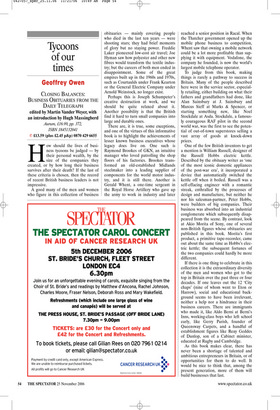Tycoons of our times
Geoffrey Owen
CLOSING BALANCES: BUSINESS OBITUARIES FROM THE DAILY TELEGRAPH edited by Martin Vander Weyer, with an introduction by Hugh Massingberd Aurum, £16.99, pp. 372, ISBN 1845132041 ✆ £13.59 (plus £2.45 p&p) 0870 429 6655 How should the lives of business tycoons be judged — by their personal wealth, by the size of the companies they created, or by how long their business survives after their death? If the last of these criteria is chosen, then the record of recent British business leaders is not impressive.
A good many of the men and women who figure in this collection of business obituaries — mainly covering people who died in the last ten years — were shooting stars; they had brief moments of glory but no staying power. Freddie Laker pioneered low-cost air travel; Joe Hyman saw how polyester and other new fibres would transform the textile industry; but the careers of both men ended in disappointment. Some of the great empires built up in the 1960s and 1970s, such as Courtaulds under Frank Kearton or the General Electric Company under Arnold Weinstock, no longer exist.
Perhaps this is Joseph Schumpeter’s creative destruction at work, and we should be quite relaxed about it. Another possibility is that the British find it hard to turn small companies into large and durable ones.
There are, it is true, some exceptions, and one of the virtues of this informative book is to highlight the achievements of lesser known business executives whose legacy does live on. One such is Raymond Brookes of GKN, an intuitive manager who loved patrolling the shop floors of his factories. Brookes transformed an old-established Midlands steelmaker into a leading supplier of components for the world motor industry, and it is still there. Another is Gerald Whent, a one-time sergeant in the Royal Horse Artillery who gave up the army to work in industry and later reached a senior position in Racal. When the Thatcher government opened up the mobile phone business to competition, Whent saw that owning a mobile network could be a lot more profitable than supplying it with equipment. Vodafone, the company he founded, is now the world’s largest mobile telephone operator.
To judge from this book, making things is rarely a pathway to success in Britain. Many of the people described here were in the service sector, especially retailing, either building on what their fathers and grandfathers had done, like Alan Sainsbury at J. Sainsbury and Marcus Sieff at Marks & Spencer, or starting something new, like Noel Stockdale at Asda. Stockdale, a famously courageous RAF pilot in the second world war, was the first to see the potential of out-of-town superstores selling a vast array of goods at knock-down prices.
One of the few British inventors to get a mention is William Russell, designer of the Russell Hobbs electric kettle. Described by the obituary writer as ‘one of the most iconic domestic appliances of the post-war era’, it incorporated a device that automatically switched the kettle off when it boiled. Russell was a self-effacing engineer with a romantic streak, enthralled by the processes of design and manufacture, but neither he nor his salesman-partner, Peter Hobbs, were builders of big companies. Their business was absorbed into an industrial conglomerate which subsequently disappeared from the scene. By contrast, look at Akio Morita of Sony, one of several non-British figures whose obituaries are published in this book. Morita’s first product, a primitive tape-recorder, came out about the same time as Hobbs’s electric kettle; the subsequent fortunes of the two companies could hardly be more different.
If there is one thing to celebrate in this collection it is the extraordinary diversity of the men and women who got to the top in Britain over the past three or four decades. If one leaves out the 12 ‘City chaps’ (nine of whom went to Eton or Harrow), social and educational background seems to have been irrelevant, neither a help nor a hindrance in their business careers. There are immigrants who made it, like Aldo Berni at Berni’s Inns, working-class boys who left school early, like Gerry Parish, founder of Queensway Carpets, and a handful of establishment figures like Reay Geddes of Dunlop, son of a Cabinet minister, educated at Rugby and Cambridge.
As this book makes clear, there has never been a shortage of talented and ambitious entrepreneurs in Britain, or of opportunities for them to do well. It would be nice to think that, among the present generation, more of them will build businesses that last.


























































































 Previous page
Previous page